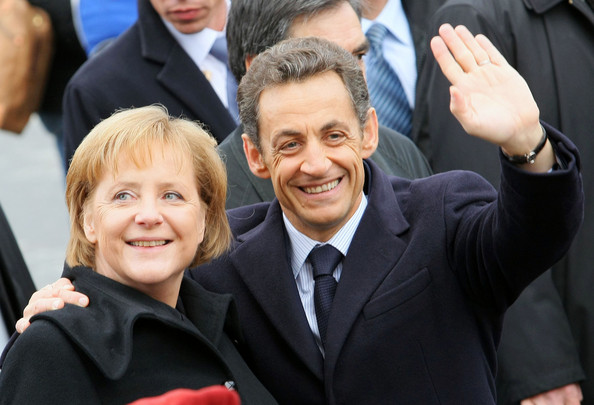One Continent, Under France and Germany

Looks like the EU has found an alternative to German domination of everybody else. It's French-German domination of everybody else.
The grand "deal" announced earlier this week has something for both France and Germany. For the Germans, France will temporarily stop talking about eurobonds and will agree to automatic sanctions for violation of new budget rules. For the French, those automatic sanctions can be cancelled by a supermajority vote of unknown quantum, but very likely guaranteeing that France will never be sanctioned for its serial ambivalence toward budget rules, whether their own or anyone else's.
The remaining details of their proposal are vague, or at least not entirely public, and the summit is on December 9th. There are other proposals on the table, also not yet public. Nevertheless, it appears that non-eurozone members will either be asked to participate or need to vote on something, since “Sarkozy said the new treaty would be either for all 27 EU members or for the 17 members of the eurozone, with other nations signing on a voluntary basis.” So who must agree is in serious question, and anything non-eurozone members must agree upon is likely irrelevant to the current crisis.
(A side note: Sarkozy is feinting that if all 27 do not agree that the 17 eurozone members will carry on on an intergovernmental basis outside the EU. No word on what the Commission thinks about being cut out.)
Brinkmanship is the order of the day. Merkel is no Bismarck, but the method is similar. The ECB has already signaled that it will not buy bonds unless and until the leaders hammer out some deal presumably similar to the Merkel-Sarkozy proposal. Though the ECB maintains a certain amount of independence, remember that Germany and France have over the years fought that independence, occasionally successfully.
Apparently, the ECB will receive a sop for its deal-boosting: the AP reported that eurozone members are expected to be asked to promise “not to criticize or otherwise comment on the work of the ECB.” This unprecedented gag order on a EU institution is a grim omen for liberty as well as bad policy in markets where more free information is a good thing.
Also, the deal is presented as a fait accompli. Christian Noyer, president of Banque de France, in demonizing S&P’s placing of 15 eurozone countries on credit watch as purely political, “said that ‘once again’ they had got the timing wrong by announcing its decision just after the Franco-German accord.” What Noyer did not say is that the Franco-German accord means nothing unless other member states agree as well. Assuming assent is not typically an effective way to ask for support, unless the fix is already in.
These methods are similar to what France used on Britain in 1962 to delay British membership in (what is now) the EU just long enough to finalize the Common Agricultural Policy, the great EU entitlement of the French and unarguably the reason for de Gaulle’s participation in the EU. In an all-night session on a matter British Prime Minister Ted Heath thought had been resolved before, France again asked Britain to agree to essentially abandon its Commonwealth by imposing tariffs on British imports of produce, which would and now does greatly favor French agriculture. When Britain could not agree, and certainly not on the spot, de Gaulle had all he needed to veto Britain’s membership in the EU until the CAP became part of what is called the acquis communitaire, or what all new members must agree on to be part of the EU, and Britain didn’t have to be asked anymore if it wanted to be in the EU.
The summit thus has all the elements for a diplomatic surprise attack: unclear details from the putative hosts, ramped-up urgency (though the situation certainly warrants some), and a take-it-or-we-go-our-own-way mien. Attendees should not be surprised to see new details on the fly that "must" be agreed to or risk destroying the eurozone and the EU. These diplomatic games, however effective they end up being, belie the seriousness of the subject matter being addressed at the summit, and may well end up jeopardizing the prospect of a useful result.

